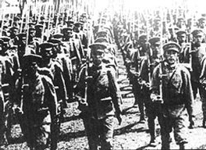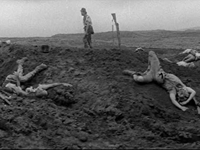Honors Arts & Sciences 210a: Modern Japan through Cinema
|
Professor Ted Mack
MTWThF 1:10-3:20 SMI 310
This course will be an introduction to modern Japan through films, in which we will use a wide variety of twentieth-century works to discuss an array of topics. Not only will we be viewing films in a variety of genres -- documentary, drama, comedy, science fiction, supernatural, avant-garde, and animation -- we will also be discussing topics ranging from the nature of art to the moral questions of nuclear modernity. Although our discussions will be sensitive to the specific nature of film as an expressive medium, we will consider the topics of art, history, society, war, propaganda, tradition, and morality.
Students are expected to watch films on their own prior to class discussion. Some films are available via streaming through Hulu+  , which is a for-profit service that is not affiliated with the University of Washington. All films are also available in DVD format for viewing in the Media Center. , which is a for-profit service that is not affiliated with the University of Washington. All films are also available in DVD format for viewing in the Media Center.
H A&S 210 can be used to fulfill the national cinema requirement for the Cinema Studies degree in the Department of Comparative Literature.
The following assignments and schedule are tentative and subject to change.
|
| DATE |
ASSIGNMENTS |
|
|
| June 18 |
View in class: Selections from "Know your Enemy: Japan" (Frank Capra, 1945) |
 |
|
| June 19 |
 "Sisters of the Gion" (Mizoguchi Kenji, 1936) "Sisters of the Gion" (Mizoguchi Kenji, 1936) |
 |
|
| June 20 |
 "Fires on the Plain" (Ichikawa Kon, 1959) "Fires on the Plain" (Ichikawa Kon, 1959) |
 |
|
| June 21 |
"Black Rain" (Imamura Shôhei, 1989) |
 |
|
| June 22 |
"Godzilla" (Honda Ishirô, 1954) |
 |
|
| June 25 |
 "Women of the Night" (Mizoguchi Kenji, 1948) "Women of the Night" (Mizoguchi Kenji, 1948) |
 |
|
| June 26 |
 "Late Spring" (Ozu Yasujirô, 1949) "Late Spring" (Ozu Yasujirô, 1949) |
 |
|
| June 27 |
 "Tokyo Story" (Ozu Yasujirô, 1953) "Tokyo Story" (Ozu Yasujirô, 1953) |
 |
|
| June 28 |
 "Stray Dog" (Kurosawa Akira, 1949) "Stray Dog" (Kurosawa Akira, 1949) |
 |
|
| June 29 |
 "The Bad Sleep Well" (Kurosawa Akira, 1960) "The Bad Sleep Well" (Kurosawa Akira, 1960) |
 |
|
| July 2 |
 "Repast" (Naruse Mikio, 1951) "Repast" (Naruse Mikio, 1951) |
 |
|
| July 3 |
 "When a Woman Ascends the Stairs" (Naruse Mikio, 1960) "When a Woman Ascends the Stairs" (Naruse Mikio, 1960) |
 |
|
| July 5 |
 "Woman in the Dunes" (Teshigahara Hiroshi, 1964) "Woman in the Dunes" (Teshigahara Hiroshi, 1964) |
 |
|
| July 6 |
"Tokyo Olympiad" (Ichikawa Kon, 1965) |
 |
|
| July 9 |
"Death by Hanging" (Ôshima Nagisa, 1968) |
 |
|
| July 10 |
"Battles without Honor and Humanity" (Fukasaku Kinji, 1973) |
 |
|
| July 11 |
"The Emperor's Naked Army Marches On" (Hara Kazuo, 1987) |
 |
|
| July 12 |
"Tampopo" (Itami Jûzô, 1985) |
 |
|
| July 13 |
"Spirited Away" (Miyazaki Hayao, 2001) |
 |
|
| July 16 |
"Millenium Actress" (Kon Satoshi, 2001) |
 |
|
| June 17 |
Review (PDF of Review presentation here) |
|
|
| July 18 |
Final Exam |
|
EXPECTATIONS and GRADING
PARTICIPATION: Participation in classroom discussions is central to successful performance in the class. Each evening you will be expected to watch a film that will be discussed the following day. Students must have seen the relevant film before class meetings and have submitted (via Collect It dropbox) a brief (250-word) reaction paper by 11am the day of class. We will discuss what is appropriate in terms of a response in the first class meeting, but you will also find some useful advice on writing the response papers here.
Some films may be available (to members of the class) to be streamed from the UW Media Center. Please visit the course's streaming media reserves page. Please note that Quicktime Player (free) is required to view the films, and that the links do not work from some browsers, including Safari.
GRADING: Grades will be determined through a combination of the student's preparation for and participation in discussions (50%), response papers (30%), and a final examination (20%).
STUDY GROUPS: I encourage students to meet outside of class to discuss the films and problems they have encountered in interpreting them.
CHEATING AND PLAGIARISM: The presentation of another's words and ideas as one's own is a serious offense; violations will be dealt with according to the University codes of conduct, which stipulate sanctions up to and including expulsion.
ACADEMIC ACCOMMODATIONS: I will do everything I can to accommodate students with particular needs. To request such an accommodation, please contact Disabled Student Services, 448 Schmitz, (206) 543-8924 (V/TTY). If you have a letter from Disabled Student Services indicating that you require such accommodation, we can discuss ways to meet those needs.
Page last updated on
July 13, 2012
![]() , which is a for-profit service that is not affiliated with the University of Washington. All films are also available in DVD format for viewing in the Media Center.
, which is a for-profit service that is not affiliated with the University of Washington. All films are also available in DVD format for viewing in the Media Center.


















